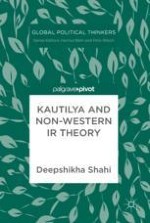2019 | OriginalPaper | Buchkapitel
4. Kautilya Reincarnated: Steering Arthaśāstra Toward an Eclectic Theory of International Relations
verfasst von : Deepshikha Shahi
Erschienen in: Kautilya and Non-Western IR Theory
Aktivieren Sie unsere intelligente Suche, um passende Fachinhalte oder Patente zu finden.
Wählen Sie Textabschnitte aus um mit Künstlicher Intelligenz passenden Patente zu finden. powered by
Markieren Sie Textabschnitte, um KI-gestützt weitere passende Inhalte zu finden. powered by
